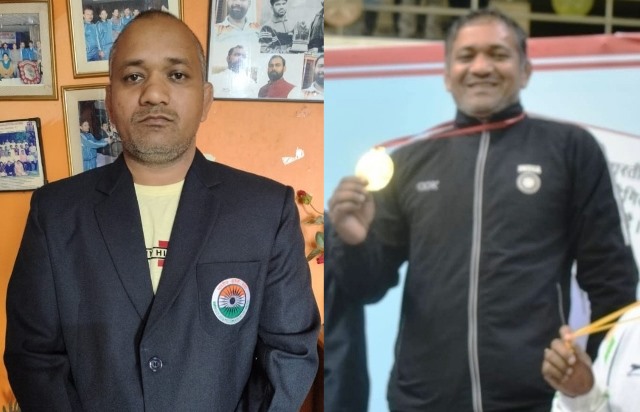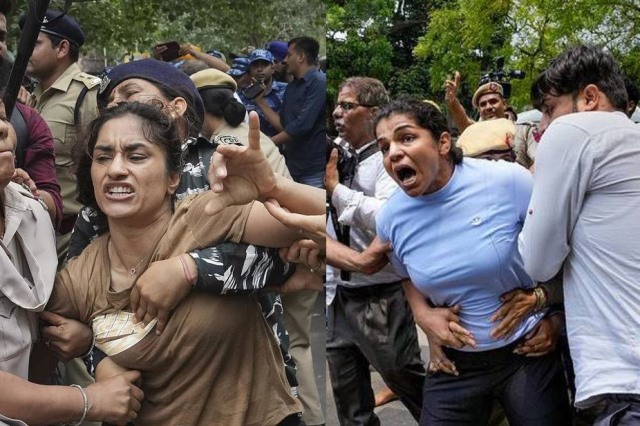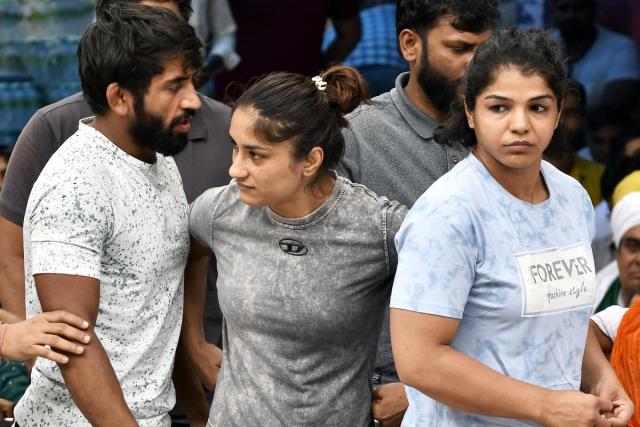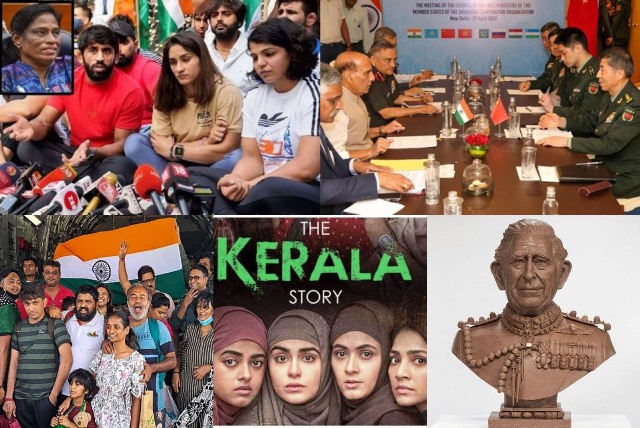India’s Sprint Queen, PT Usha, has feet of clay
Last year, India’s most celebrated woman athlete, P.T. Usha was nominated to the Rajya Sabha. A veteran sprinter, Usha has to her credit four Asian gold medals and 7 silver medals and is often called the “Queen of Indian Track and Field”. Last week, Usha came out in defence of the Wrestling Federation of India (WFI) chief, Brij Bhushan Sharan Singh, popularly known as Brij Bhushan. Bhushan, a member of India’s ruling Bharatiya Janata Party (BJP) and member of Parliament, is facing multiple accusations of sexual harassment and physical aggression.
Since January this year, Indian wrestlers have been protesting against the 66-year-old Bhusan for his alleged misbehaviour and sexual harassment of women wrestlers. The protesters have demanded his arrest and ouster from his official position. To be sure, over the years there have been several other allegations against Bhushan: he has confessed to a murder; he was involved in the demolitions of the Babri Masjid; he has been caught on camera slapping a wrestler; and he is believed to have had connections with the underworld and was charged in 1992 for helping the Dawood Ibrahim gang in organising a shoot at an Indian hospital.
When the latest controversy surrounding him erupted, and wrestlers and other sportspersons, including Olympians, organised morchas and assemblies in the capital, instead of coming out in support of those who were protesting, India’s Sprint Queen Usha chose to take a surprising line: she said that the agitations against him were “not good for the country’s image” and that those who were taking up the cause of women wrestlers were “indisciplined”.
Patronage does that to some people. When the ruling regime rewards you with a position of prestige–in the 58-year-old Usha’s case, it was the trappings of a Rajya Sabha membership–it can create a sense of pathetic obeisance to your patron and lead to loss of sensibilities. Unfortunately, Usha, who is also the chief of the Indian Olympics Association, has fallen victim to that disgusting syndrome.
To be sure, three months ago, India’s sports ministry constituted a committee, headed by boxing star Mary Kom, to examine the charges against Bhushan but till now the committee has not returned with any report or observations. Incidentally, Kom, 40, has also served as a Rajya Sabha MP from 2016 to 2022. She was also nominated to the upper house by the ruling regime.
The politics of patronage is an odious thing. In India, it afflicts people from all walks of life. Every year before the run-up to the national Padma awards begins there is hectic lobbying that many resort to. As is the case when it comes to lobbying for the 12 nominations to the Rajya Sabha. With few exceptions, in most cases the nominees are decided by the ruling regime on political considerations and, also in most cases, those who accept the nominations appear to also compromise with their vertebrae: like Usha, they become spineless.
Meanwhile, even as a police case has been filed against Bhushan, the WFI chief is adamant and insists that he is innocent. He has said that he will cooperate but is not willing to face investigations as a criminal. The controversy surrounding him rages on.
As defence ministers meet, India’s border spat with China continues
Last week, India’s defence minister Rajnath Singh met with his Chinese counterpart General Li Shangfu and emphasised that China had violated the terms of existing agreements between the two countries in the border row in eastern Ladakh. China claims large tracts that India insists belong to it and recently a list of locations in the Indian state of Arunachal Pradesh that were renamed in Chinese by China were revealed.
The Indian Army and the Chinese People’s Liberation Army (PLA) have had 18 rounds of talks to ease tensions along LAC in the region but a resolution has remained elusive. The latest border row between the two countries has been on for three years.
Meanwhile, in response to India’s allegations of violations, China has stated that the situation along the Line of Actual Control, a notional demarcation line that separates Indian-controlled territory from Chinese-controlled territory in the Sino-Indian border dispute, remained “stable”.
In lay terms, the talks between the two defence ministers have failed to unlock the stalemate over the border dispute.
Politicising the rescue of Indians stranded in Sudan
When the nationals of a country are caught up and stranded in another country because of civil strife or war in that foreign location, it is the onus of their government to arrange means of repatriating them. India has done the same. When civil war erupted in the north-east African nation of Sudan with anti-government militia clashing with the Sudanese army, thousands of Indians were stranded there facing huge risks to their lives. Accordingly, the Indian government sprang into action and launched an operation, coordinated between the government and the Indian embassy, which rescued stranded Indians and repatriated them back to India.
The action was laudable and on point. However, it was named Operation Kaveri, a reference to the major river in southern India that flows through the states of Karnataka, Tamil Nadu, and Puducherry before emptying into the Bay of Bengal. The naming of the rescue operation, believed to be done at the behest of Prime Minister Narendra Modi, is of significance.
Many of the stranded Indians in Sudan are originally from the southern states of Karnataka and Tamil Nadu where the River Kaveri is revered and worshipped. In these states, it is a sacred river that is worshipped as the Goddess Kaveriamma (Mother Cauvery and is considered to be among the seven holy rivers of India. It is extensively used for agriculture in both Karnataka and Tamil Nadu.
Cut now to politics. On May 10, Karnataka will hold its assembly elections. Opposition parties have alleged that naming the Sudan operation after the sacred river is aimed at generating positive sentiment for the Bharatiya Janata Party, which wants to fare well in the polls in order to build an inroad into southern states where its clout and influence is poor. The Congress has called it a “low-blow tactic” by the BJP, while the latter has countered it by citing that the code name for the operation notes the sacredness of the river. When the government took action to repatriate Indians stranded in Ukraine, it called it Operation Ganga.
Meanwhile, India has successfully moved approximately 1,700 to 2,000 Indian nationals out of the conflict zones in Sudan.
Another film; another controversy
The trailer of the film, Kerala Story, by film producer, Vipul Amrutlal Shah, has led to an eruption of controversy. The film, which is to be released on May 5, is believed to be about the story of how women from the Indian state of Kerala were duped and trafficked to the Islamic State of Iraq and Syria in the strife-ridden region of Syria.
The film purportedly shows how “Love Jihad” was used to lure more than 30,000 women from Kerala by the ISIS. “Love Jihad” is a term that originated in India, referring to an alleged practice of Muslim men targeting non-Muslim women for conversion to Islam through seduction, love, and marriage. The term is not recognised as a legal or sociological concept in India, and the claims of its existence are considered controversial and contested.
The film’s teaser was released last November but in a complaint filed by a journalist based in Chennai, it has been alleged that the film depicts Kerala as a “terror-supporting state” and that it undermines India’s intelligence agencies. Different political parties have also waded into the controversy and fear that its release could spark communal tensions. Hindu hardliners, on the other hand, have taken to social media and other platforms in support of the film.
Not long ago, another film, The Kashmir Files, directed by Vivek Agnihotri, generated controversy and criticism, with some accusing it of being politically motivated and promoting a divisive narrative. One of the main criticisms of the film is that it portrays the exodus of Kashmiri Pandits as a result of Muslim fundamentalism and terrorism, while downplaying the role of the Indian government and security forces in the displacement. Critics argue that the film’s portrayal of the situation is one-sided and ignores the complex political and historical factors that led to the exodus.
Let them eat Chocolate?
Days before his formal coronation on May 6, a life-sized bust of King Charles has been made from more than 17 litres of melted chocolates. The bust weighs 23 kg and took four weeks to make. It will be on display in the town of Slough, bordering Greater London.
There is no information, though, about what will eventually happen to the chocolate bust made by Mars, the confectionery company.
The idea of making Chocolate Charles, although not associated with the Palace or the monarch in any way, recalls the old story about the phrase “let them eat cake”, which is often attributed to Marie Antoinette, the Queen of France during the French Revolution. The story goes that when she was told that the people of France had no bread to eat, she callously responded, “Let them eat cake.”
With the British economy under stress–high inflation, shortages of food and energy in the aftermath of Brexit, and several unseemly political controversies–a bust of its king made out of chocolates could seem a tad ironic, or even darkly surreal.




